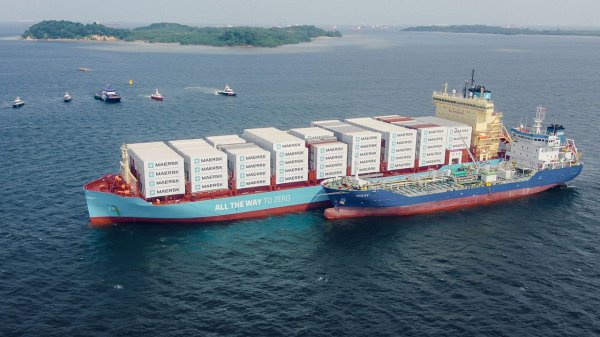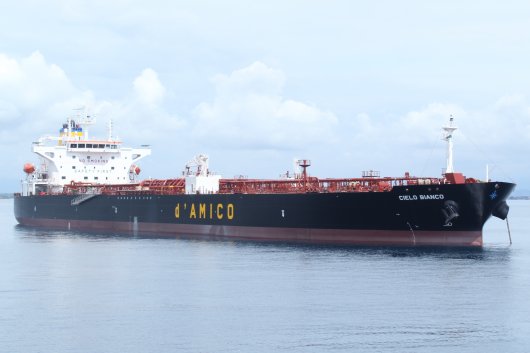D'Amico to test biofuel's decarbonisation potential
Project involving vessel trials to examine possible reduction in CO2 emissions.
A joint industry project (JIP) involving vessel trials has been launched to calculate possible reductions in CO2 emissions from the use of biofuel blends.
Shipping group d'Amico has teamed up with the American Bureau of Shipping (ABS), the Liberian Registry, Lloyd's Register's (LR) Fuel Oil Bunker Analysis Advisory Service (FOBAS), MAN Energy Solutions, the Royal Institution of Naval Architects (RINA) and Trafigura to test B30 biofuel blends derived from advanced second-generation feedstock on board of one of its LR1 product tankers already in EEDI Phase 2.
The JIP will calculate possible CO2 emission reductions through a 'lifecycle strategy' using the so-called well-to-wheel (WTW) analysis, from raw material acquisition to vessel operation, to compare the performance of biofuels against traditional fossil fuels.
Moreover, the project will assess the stability and degradation of the biofuel in relation to storage time and NOx emissions to confirm that the use of biofuel B30 will not affect the Tier II certification of the engines and to measure the effects and improvements on EEXI and CII indices adopted as short-term measures by the IMO.
The tests are to be undertaken on d'Amico's Cielo Bianco and Cielo di Rotterdam vessels, and the low-carbon fuel is scheduled to be supplied in the Amsterdam-Rotterdam-Antwerp (ARA) region by TFG Marine - a joint venture between Trafigura, Frontline and Golden Ocean Group.
The pre-trial phase of the project commenced in March 2021 - when details of the nature and composition of the biofuel blends were made available and protocols relating to fuel testing, inspections, NOx measurement and sea trials were established. It was also necessary to prepare the risk assessment, adapt the swap procedures and develop a consistent crew training program.
The second phase, involving vessel trials, has been scheduled for mid-June 2021 in accordance with planned trade routes. The trial phase will monitor the behaviour of the main engine, diesel generators and boilers whilst burning the biofuel blend, and also evaluate performance, fuel storage capability and NOx levels.
In the post-trial phase, the reported emissions will be processed and analysed with particular focus on CO2 and NOx emissions in relation to existing EEXI and CII guidelines.
The project is planned to run up until mid-July 2021.
A fuel for the transition towards decarbonisation
Discussing the merits of using biofuel, Naeem Javaid, Global Operations Manager – Lloyd's Register FOBAS, explained: "Biofuels are drop-in fuels with no modification to system and equipment being required, making them a potential option as a transition fuel to support the decarbonisation of the maritime industry."
Georgios Plevrakis, ABS Director, Global Sustainability, commented: "Carbon-neutral biofuels could offer significant benefits to the marine sector's drive to decarbonize operations. This trailblazing project will make a vital contribution to our understanding of the potential of biofuels in shipping, its implications for equipment and their impact on decarbonization efforts."
Jamie Torrance, Head of Distillate & Fuel Oil Trading for Trafigura, said: "As one of the world's largest commodity trading and logistics companies we are committed to reduce maritime carbon emissions, including by investing in the development and supply of transitionary fuels such as biofuels. TFG Marine, Trafigura’s joint venture marine fuel supply business with Frontline and Golden Ocean, is already successfully demonstrating the safe and effective use of biofuels in the Amsterdam-Rotterdam-Antwerp (ARA) region through sea trials and laboratory testing, and will take an active role in this joint industry project to test the B30 biofuel blend derived from advanced second-generation feedstock."
Shipping group d'Amico has teamed up with the American Bureau of Shipping (ABS), the Liberian Registry, Lloyd's Register's (LR) Fuel Oil Bunker Analysis Advisory Service (FOBAS), MAN Energy Solutions, the Royal Institution of Naval Architects (RINA) and Trafigura to test B30 biofuel blends derived from advanced second-generation feedstock on board of one of its LR1 product tankers already in EEDI Phase 2.
The JIP will calculate possible CO2 emission reductions through a 'lifecycle strategy' using the so-called well-to-wheel (WTW) analysis, from raw material acquisition to vessel operation, to compare the performance of biofuels against traditional fossil fuels.
Moreover, the project will assess the stability and degradation of the biofuel in relation to storage time and NOx emissions to confirm that the use of biofuel B30 will not affect the Tier II certification of the engines and to measure the effects and improvements on EEXI and CII indices adopted as short-term measures by the IMO.
The tests are to be undertaken on d'Amico's Cielo Bianco and Cielo di Rotterdam vessels, and the low-carbon fuel is scheduled to be supplied in the Amsterdam-Rotterdam-Antwerp (ARA) region by TFG Marine - a joint venture between Trafigura, Frontline and Golden Ocean Group.
The pre-trial phase of the project commenced in March 2021 - when details of the nature and composition of the biofuel blends were made available and protocols relating to fuel testing, inspections, NOx measurement and sea trials were established. It was also necessary to prepare the risk assessment, adapt the swap procedures and develop a consistent crew training program.
The second phase, involving vessel trials, has been scheduled for mid-June 2021 in accordance with planned trade routes. The trial phase will monitor the behaviour of the main engine, diesel generators and boilers whilst burning the biofuel blend, and also evaluate performance, fuel storage capability and NOx levels.
In the post-trial phase, the reported emissions will be processed and analysed with particular focus on CO2 and NOx emissions in relation to existing EEXI and CII guidelines.
The project is planned to run up until mid-July 2021.
A fuel for the transition towards decarbonisation
Discussing the merits of using biofuel, Naeem Javaid, Global Operations Manager – Lloyd's Register FOBAS, explained: "Biofuels are drop-in fuels with no modification to system and equipment being required, making them a potential option as a transition fuel to support the decarbonisation of the maritime industry."
Georgios Plevrakis, ABS Director, Global Sustainability, commented: "Carbon-neutral biofuels could offer significant benefits to the marine sector's drive to decarbonize operations. This trailblazing project will make a vital contribution to our understanding of the potential of biofuels in shipping, its implications for equipment and their impact on decarbonization efforts."
Jamie Torrance, Head of Distillate & Fuel Oil Trading for Trafigura, said: "As one of the world's largest commodity trading and logistics companies we are committed to reduce maritime carbon emissions, including by investing in the development and supply of transitionary fuels such as biofuels. TFG Marine, Trafigura’s joint venture marine fuel supply business with Frontline and Golden Ocean, is already successfully demonstrating the safe and effective use of biofuels in the Amsterdam-Rotterdam-Antwerp (ARA) region through sea trials and laboratory testing, and will take an active role in this joint industry project to test the B30 biofuel blend derived from advanced second-generation feedstock."

|
VARO Energy expands renewable portfolio with Preem acquisition
All-cash transaction expected to complete in the latter half of 2025. |
|
|
|
||

|
NYK trials biofuel in milestone coal carrier test
Vessel is used to test biofuel for domestic utility company. |
|
|
|
||

|
H-Line Shipping orders LNG bunkering vessel
Vessel with 18,000-cbm capacity to run on both LNG and MDO. |
|
|
|
||

|
How to engineer and manage green shipping fuels | Stanley George, VPS
Effective management strategies and insights for evolving fuel use. |
|
|
|
||

|
Swedish government bans scrubber wastewater discharges
Discharges from open-loop scrubbers to be prohibited in Swedish waters from July 2025. |
|
|
|
||

|
MAN Energy Solutions achieves 100% load milestone for ammonia engine
Latest tests validate fuel injection system throughout the entire load curve. |
|
|
|
||

|
Petrobras secures ISCC EU RED certification for B24 biofuel blend at Rio Grande
Blend consisting of 24% FAME is said to have been rigorously tested to meet international standards. |
|
|
|
||

|
Stolt-Nielsen to fully control Avenir LNG with acquisition
Share purchase agreement to buy all shares from Golar LNG and Aequitas. |
|
|
|
||

|
Bureau Veritas supports launch of CIMC SOE's LNG bunkering vessel
Handover of Seaspan Energy's cutting-edge 7,600-cbm vessel completed. |
|
|
|
||

|
Methanol as a marine fuel | Steve Bee, VPS
How environmental legislation has driven the development of low-sulphur fuels and methanol-ready ships. |
|
|
|
||
Related Links
- · Bunker One to supply biofuel in Danish straits [Insights]
- · Samskip extends commitment to biofuel bunkers [Insights]
- · ExxonMobil completes trial of its first bio fuel oil [Insights]

